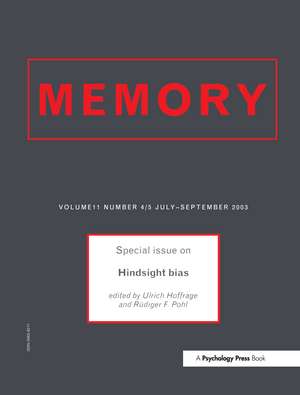Hindsight Bias: A Special Issue of Memory: Special Issues of Memory
Editat de Ulrich Hoffrage, Rüdiger Pohlen Limba Engleză Paperback – 7 aug 2003
Preț: 252.41 lei
Preț vechi: 303.64 lei
-17% Nou
Puncte Express: 379
Preț estimativ în valută:
48.31€ • 50.66$ • 39.92£
48.31€ • 50.66$ • 39.92£
Comandă specială
Livrare economică 09-23 ianuarie 25
Doresc să fiu notificat când acest titlu va fi disponibil:
Se trimite...
Preluare comenzi: 021 569.72.76
Specificații
ISBN-13: 9781841699387
ISBN-10: 1841699381
Pagini: 176
Dimensiuni: 203 x 273 x 9 mm
Greutate: 0.43 kg
Ediția:New.
Editura: Taylor & Francis
Colecția Psychology Press
Seria Special Issues of Memory
Locul publicării:Oxford, United Kingdom
ISBN-10: 1841699381
Pagini: 176
Dimensiuni: 203 x 273 x 9 mm
Greutate: 0.43 kg
Ediția:New.
Editura: Taylor & Francis
Colecția Psychology Press
Seria Special Issues of Memory
Locul publicării:Oxford, United Kingdom
Cuprins
U. Hoffrage, R.F. Pohl, Introduction. R.F. Pohl, M. Eisenhauer, O. Hardt, SARA - A Cognitive Process Model to Simulate the Anchoring Effect and Hindsight Bias. R. Hertwig, C. Fanselow, U. Hoffrage, Hindsight Bias: How Knowledge and Heuristics Affect Our Reconstruction of the Past. O. Hardt, R.F. Pohl, Hindsight Bias as a Function of Anchor Distance and Anchor Plausibility. S. Schwarz, D. Stahlberg, Strength of the Hindsight Bias as a Consequence of Meta-cognitions. L. Werth, F. Strack, An Inferential Approach to the Knew-it-all-along Phenomenon. M.V. Pezzo, Surprise, Defence, or Making Sense: What Removes the Hindsight Bias? M.M. Mark, R. Reiter, K.M. Eyssell, L.L. Cohen, S. Mellor, "I Couldn't Have Seen it Coming": The Impact of Negative Self-relevant Outcomes on Retrospections about Foreseeability. B. Renner, Hindsight Bias after Receiving Self-relevant Health-risk Information: A Motivational Perspective. H. Blank, V. Fischer, E. Erdfelder, Hindsight Bias in Political Elections. J. Musch, Personality Differences in Hindsight Bias.
Recenzii
'This collection of articles represents a great contribution towards the literature on hindsight bias and towards our understanding of the origin of this phenomenon, while opening many interesting new paths for research.' - Gaelle Villejoubert, Applied Cognitive Psychology
Descriere
With hindsight, we tend to exaggerate what we had known with foresight. This special issue of Memory explores this phenomenon.









